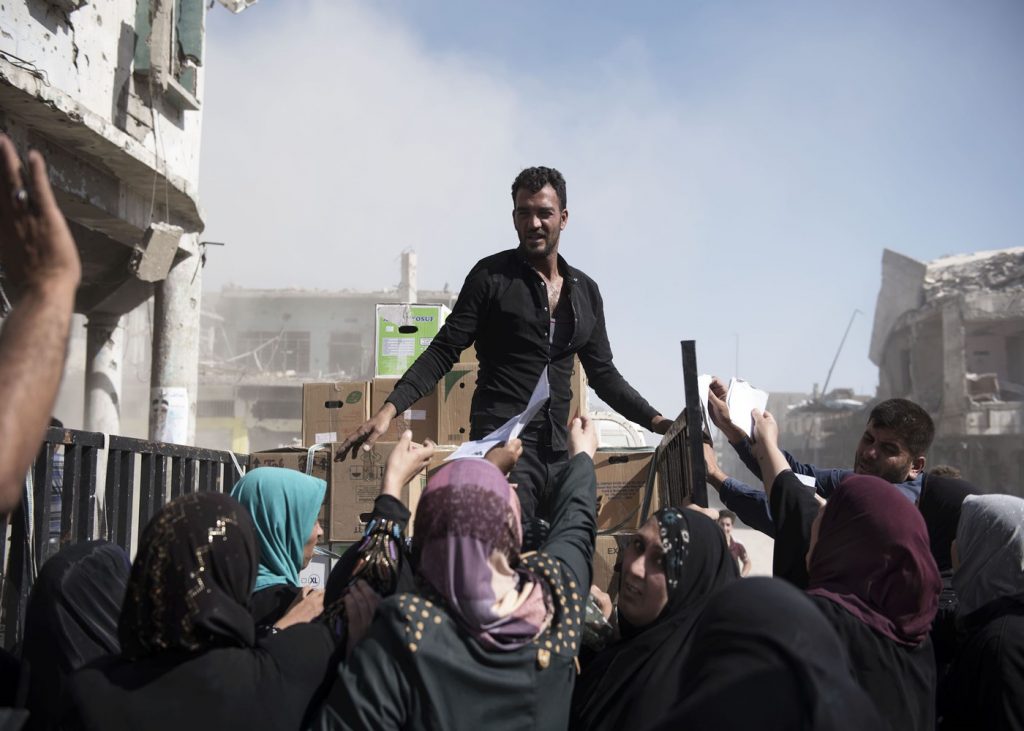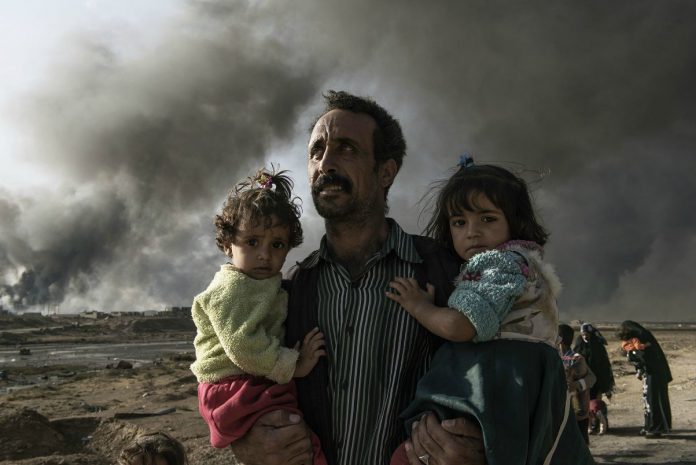(THIS ARTICLE IS MACHINE TRANSLATED by Google from Norwegian)
In the middle of a flat and rocky landscape stands an old iron bed. There are blankets as if someone has slept in it, and in the background you see ruined buildings and the black smoke from a burning oil well. An old car slowly bumps past on the paved dirt road.
Images are full of symbolism, and there are many of them ISIS Tomorrow: The Lost Souls of Mosul. The film describes the state of Iraqi city in January 2018, six months after it was liberated from Islamic State. We are getting close to the many scars on the body and soul that three years of Islamic terrorist regime has left in the city, and the film will stand as a vague reminder of the many unfinished accounts left after the so-called caliphate formally is down.
Work instead of school
The hopelessness lies above the urban landscape. The film opens with a street scene where everything is gray. There are gray ruins all around, the air is gray with dust, and as an absurd contrast there is a light signal that glows bright green in the ruined city. But green light for what?
The human ruins cannot easily be rebuilt.
The film depicts the city's inhabitants by cutting back and forth between the various fates. The first we meet is the 14-year-old boy who went to school before it all broke loose. Before ISIS, he says, as if operating on a special time bill. His father had a motorcycle workshop in town, but the workshop is eradicated and his father handicapped, so the boy has to work to provide for the family. Together with a group of peers, he sells old iron, which they peel from the ruins. Meanwhile, he dreams that the men who cut his throat over his uncle will suffer the same cruel death.

As a stark contrast, we meet Mahmoud at the age of 16. We only see him as a black profile, because he has something to hide. Mahmoud confessed to Islamic State, and he still sees martyrdom and suicide as the highest goal in life.
These are the very sharp-cut counterpoints, but sometimes everything else comes along. What does the boy do if his father joined Islamic State and was killed in the fighting? He himself wanted nothing to do with it and was mature enough to warn his father, but to no avail. For him, of course, it is legitimate to miss his father, and also to forgive him, although this is not something he can say out loud in the dusty streets of the city.
martyr widow
Forgiveness and revenge are a couple of themes that are pressing in postwar Mosul.
Nour is a good example. The young woman married one of the Caliphate's front fighters. It was her father's highest wish, and the day after the wedding, both he and her husband returned to the war to never return. Now she sits as a widow in a naked apartment and dares not show up in the street. She professes her innocence, but also admits that she loved her husband and respects his choices in life, or rather death. Now she looks forward to meeting him beyond, and that's all her life content, stamped as she is.

The same is true in one of the city's neighborhoods, where children designate the homes that belong to the ISIS families. They are all painted over with graffiti, so there is nothing wrong with that. The residents, mostly women and children, are in detention camps – a bare plain with tents, swirling dust and fence around. A crying girl tells her she was sent out to fetch water for her mother. When a policeman saw her at the water post, he ordered her to pour the water, because the dogs of Islamic State should not be rewarded with water!
Radicalized in prison
The film is made by people from the West, and it is the people from the West who need to see it. I even got a little bad taste in my mouth as a whole family, consisting of women and should, collapses in despair over all the lost and the hopeless prospects. Shouldn't the camera stop somewhere and leave people alone with their feelings?
The hopelessness lies above the urban landscape.
But the intention is precisely to expose all the emotions after the hell of the war. In this way, the film becomes a call to the many in the West who believe that everything is well, as long as Islamic State is driven out of Mosul. The physical reconstruction is ongoing, and that with Western support, but the human ruins cannot be reconstructed. This is perhaps where the real work lies.
It is not very surprising, yet shocking to hear Mahmoud say that the loss of Mosul and Raqqa is only a matter of land. For him, the main thing is that the Islamic State lives on inside of him and thousands of like-minded people, and therefore it is only a matter of time before it resurfaces. As one of the women in the detention camp says, Abu Bakr al-Baghdadi, the current head of the Islamic State, was self-radicalized while in prison.
The movie is shown on Arab movie days, 20-24. March.


